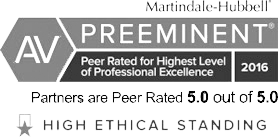In Utah, most criminal offenses are governed by a statute of limitations. The criminal statute of limitations in Utah protects against the burden of defending yourself against a crime that occurred so long in the past that memories have faded and evidence is more difficult to obtain.
In most criminal cases, the statute of limitations in Utah requires that
For purposes of this rule on the statute of limitations, a prosecution is commenced upon
For some of the most serious crimes in Utah, the statute of limitations contains a list of offenses for which prosecution can be commenced at any time.
Special rules for the statute of limitations apply to prosecutions for the misuse of public money, falsification or alteration of government records, bribery, and misconduct of a public officer or employee. Special rules for the commencement of a prosecution also exist if DNA evidence would identify the defendant accused of a violent felony offense.
The attorneys at Brown, Bradshaw & Moffat, LLP, in Salt Lake City, Utah, understand the way that Utah's statute of limitations might apply to your case.
Under Utah Code Section 76-1-306, when an issue concerning the statute of limitations is raised, the judge must determine by a preponderance of the evidence whether the prosecution is barred by the limitations.
Your criminal defense attorney can raise this defense by filing a motion to dismiss, showing that the statute of limitations ran before the prosecution commenced.
The courts in Utah have held that the statute of limitations defense can be forfeited if the defense fails to raise it in a timely fashion in the trial court. If you enter a plea or go to trial without properly raising the defense, you might forfeit the right to raise this defense on appeal.
Call (801) 532-5297 today to find out how the statute of limitations might apply in your case.
Under Utah Code Section 76-1-304, the period of limitation does not run against any defendant during any period of time in which the defendant is out of the state following the commission of an offense.
If the defendant has entered into a plea agreement with the prosecution and later successfully moves to invalidate his conviction, the period of limitation is suspended from the time of the entry of the plea pursuant to the plea agreement until the time at which the conviction is determined to be invalid, and that determination becomes final.
Under Section 76-1-301(2), Utah law provides a list of offenses for which prosecution may be commenced at any time:
Under Section 76-1-301, the term "aggravating offense" is defined to mean any offense incident to which a homicide was committed.
The term "predicate offense" is defined to mean an offense described in Section 76-5-203(1) if a person (other than someone directly involved in the crime) was killed in the course of the commission, attempted commission, or immediate flight from the commission or attempted commission of the offense.
Some crimes in Utah, have a special two-year statute of limitations under Section 76-1-301.5, which applies to prosecutions for the following types of crimes:
For these criminal offenses, the prosecution must be commenced within two years after facts constituting the offense have been reported to a prosecutor having responsibility and jurisdiction to prosecute the offense.
Under Section 76-1-302, the time limitations for the prosecution of offenses can be extended when DNA evidence is used to identify the defendant:
Under Section 76-1-302(2)(a), prosecution for the violent felony offenses listed in Subsections 76-3-203.5(1)(c)(i)(A) through (CC) may be commenced at any time if the identity of the person who committed the crime is unknown but DNA evidence is collected that would identify the person at a later date.
Those violent felony offenses listed in Subsections 76-3-203.5(1)(c)(i)(A) through (CC) include:
aggravated robbery and robbery If the statute of limitations would have run but for the provisions of Subsection (2) and identification of a perpetrator is made through DNA, a prosecution shall be commenced within one year of the discovery of the identity of the perpetrator.
This provision does not apply if the statute of limitations on a crime has run as of May 5, 2003, and no charges have been filed.
Under Utah Code Section 76-1-303, special time limitations apply for fraud or breach of fiduciary obligation involving misconduct of public officer or employee.
Under Subsection (1), if the period prescribed in Section 76-1-302 has expired, a prosecution may be commenced for any offense a material element of which is either fraud or a breach of fiduciary obligation within one year after a report of the offense has been filed with a law enforcement agency.
This provision in Utah Code Section 76-1-303(1) may not extend the period of limitation as provided in Section 76-1-302 by more than three years.
Under Utah Code Section 76-1-303(3), if the period prescribed in Section 76-1-301.5 or 76-1-302 has expired, a prosecution may be commenced for:
Statute of Limitations Questions in Utah - Visit the website of the Utah state legislature to find information on all the limitations on actions laws in Utah.
Use the form above to request your free, confidential case evaluation. Our office will contact you as soon as possible to arrange for you to discuss the facts of your case with an experienced criminal defense attorney in Salt Lake City, Utah.
Note: By submitting the above form, you are requesting a free and confidential consultation with one of our attorneys to discuss the specific facts of your case. We will evaluate your unique situation and provide you with valuable information about how an attorney may be able to help you. Please do not provide any confidential or time-sensitive information using this online contact form. If your situation is urgent, please call us at (801) 532-5297. We look forward to hearing from you.
The use of this form for communication with our personnel does not establish an attorney-client relationship.
Mark has represented our son for over ten years. We have a difficult situation but we have never doubted that Mark, and now, Mike, care about him and our family. Their caring advice has been a lifeline for us.
Mike Holje was there for me and helped me get the charges dismissed. He was fantastic. I am so thankful for this firm.
Jim Bradshaw worked with me on a case and was helpful, realistic and very professional. I found him to be one of the best attorneys (and person) I have encountered.
I used Brown, Bradshaw & Moffat and would recommend them to anyone. Everyone in his or her office is kind, efficient and very responsive. You are treated respectfully and on an equal playing field.



